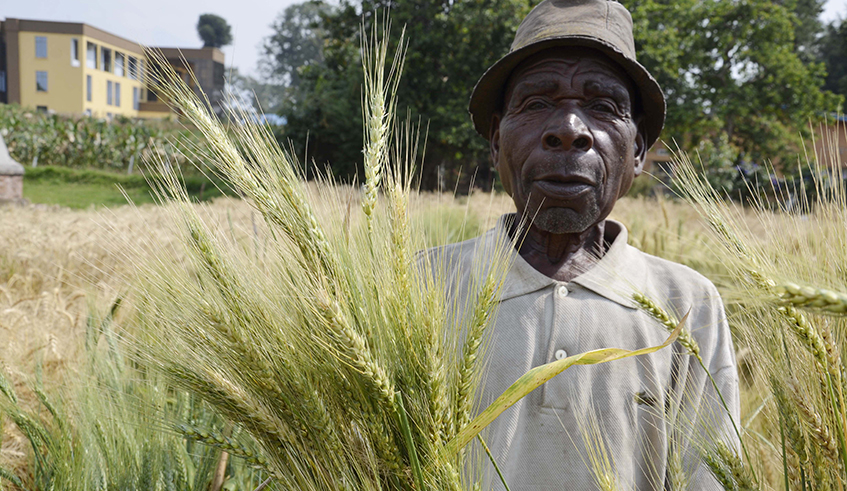

Agricultural researchers have warned that a majority of cases of fake seeds are going unreported, calling on governments in Africa to partner with the private sector to eliminate the problem.
The warning is a reaction to the 2021 report that summarizes the key findings of the study conducted by The African Seed Access Index (TASAI)-a tool that is designed to monitor and evaluate the structure, conduct, and performance of seed systems serving smallholder farmers in Africa- showing the performance of Rwanda’s seed sector.
The study focused on beans, wheat, and soybean, and maize seeds.


Beans and maize plantation of which selected seeds were planted.
Despite the good progress in access to improved seeds, Prof. Edward Mabaya, the founder of TASAI, said that there is a need for government intervention to partner with the private sector to eliminate fake seeds.
The New Times has been reporting cases of farmers seeking compensation for fake seeds in different years.
"We are measuring the number of fake seeds cases reported by seed companies. These are very few compared to the number that is actually out there meaning most of these things go unreported. None of these cases of fake seeds were even reported to the government,” he said.
He said that there is no central place that collects the number of fake seeds that are happening.
"Though the problem is seemingly small, the moment it grows it becomes very hard to control. When you report eight cases you can estimate that there are more than 50 cases out there. Government can partner with the private sector to eliminate the problem before it grows bigger. A country like Rwanda that is building a seed sector should really invest to make sure that this problem doesn’t start at all,” he said.
Meanwhile, the report shows that the access to improved seeds has been increasing.
According to the report the four crops- beans, wheat, and soybean, and maize -accounted for 80 per cent of the harvested area of cereals and legume crops in 2020.
Informal seed systems are still the main source of seed for small-scale scale farmers
The annual seasonal agricultural surveys carried out between 2017 and 2021 reveal that the informal seed system is still the main source of seed for small- scale farmers, the report shows.
However, it notes that over this period the percentage of small-scale and large-scale farmers using improved seed has increased steadily in the main cropping season (Season A).
The report notes that the percentage of small-scale farmers using improved seed has increased from six per cent in 2017 to 36 per cent in 2021 in Rwanda.
The report says that the proportion of large-scale farmers using improved seed has also increased from 52 per cent in 2017 to 89 per cent in 2021.
"This upturn has largely been fueled by government efforts to encourage the private sector involvement and investment in the seed industry,” researchers commended.
The efforts include permitting private seed companies to sell seed directly to farmers rather than requiring them to sell through government entities.
They also include increased funding to research for developing improved varieties, the creation of seed certification agency, Rwanda Inspectorate, Competition, and Consumer Protection Authority (RICA), and the creation of subsidy programmes that increase access to improved seeds.
Level of satisfaction with seeds
The report shows that satisfaction with seeds increased for maize, bean, and wheat from 75 per cent and 77 per cent to 82 per cent and 92 per cent respectively.
Satisfaction with the availability of basic seed for soya bean was excellent in both years with 87 percent.
Clement Urinzwenimana, an independent researcher in the seed sector who was part of the research team that produced the Seed Access Index for Rwanda said that, in 2018, most of the maize seeds are known as open-pollinated varieties (OPVs) were being used by farmers yet they provide low yields.
"Today, all seed multipliers are multiplying maize hybrids because they provide good yields,” he said.
Daniel Rwebigo, Seed System Division Manager in Rwanda Agriculture and Animal Resources Board (RAB) said that the report is a pivotal document for the government’s seed sector as it helps better plan with better solutions to improve the seed sector.
Rwebigo said that RAB is producing more seed varieties to increase agricultural productivity.
Between 2018 and 2020 at least 153 crop varieties were released.
These include 45 maize varieties, 11 varieties of soya beans, 15 for Irish potatoes, 19 for beans, 20 for rice, 27 for potatoes and 16 for wheat.
The index shows that 110 out of the total 150 crop varieties were bred and multiplied by RAB while 43 varieties were bred and multiplied by private companies.
One of the challenges in access to seeds, Rwabigo noted, is the poor mindset of smallholder farmers who are still reluctant to use hybrid seeds as the uptake is only at 35 percent.
"Under the agricultural transformation strategy from 2018 to 2024, we target to have 75 per cent of big-holder farmers using quality seeds and we have exceeded this target. For smallholder farmers the target is to move from 35 to 50 percent,” Rwebigo said.
According to Rwebigo, during the current season, 7,000 tonnes of hybrid maize seeds were available in the country and 60 per cent of them were locally produced.
Wheat seeds increased from 800-900 tonnes to 1,400 tonnes and soya beans from 400 to 530 tonnes.


